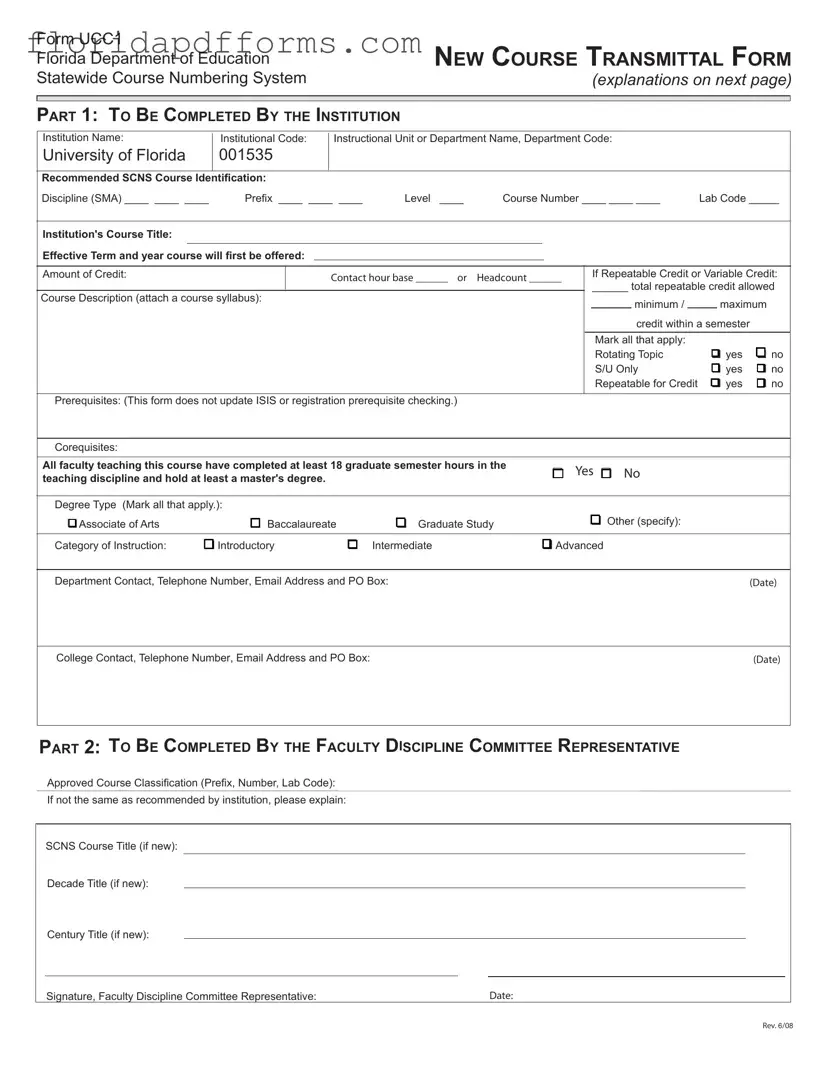
Form UCC1 |
|
|
|
|
|
|
|
|
|
|
|
|
|
New CoUrSe traNSmittal Form |
Florida Department of Education |
|
|
|
|
|
Statewide Course Numbering System |
|
|
|
|
|
|
|
|
|
|
|
|
|
|
(explanations on next page) |
|
|
|
|
|
|
|
|
|
|
|
|
|
|
|
|
|
|
|
|
|
|
|
|
|
|
|
|
|
|
|
|
|
|
|
|
|
|
|
|
|
|
|
|
|
|
|
|
|
|
|
|
|
|
|
|
|
|
|
|
|
|
|
|
|
|
|
|
|
|
|
|
|
|
|
|
|
|
Part 1: to Be ComPleted By the iNStitUtioN |
|
|
|
|
|
|
|
|
|
|
|
|
|
|
|
|
|
|
|
|
|
|
|
|
|
|
|
|
|
|
|
|
|
|
|
|
|
|
|
|
|
|
|
|
|
|
|
|
|
|
|
|
|
|
|
|
|
|
|
|
|
|
|
|
|
|
Institution Name: |
|
|
|
Institutional Code: |
Instructional Unit or Department Name, Department Code: |
|
|
|
|
|
|
|
|
|
|
|
|
University of Florida |
|
|
001535 |
|
|
|
|
|
|
|
|
|
|
|
|
|
|
|
|
|
|
|
|
|
|
|
|
|
|
|
|
|
|
|
|
|
|
|
|
|
|
|
|
|
|
|
|
|
|
|
|
|
|
|
|
|
|
|
|
|
|
|
|
|
|
|
|
|
|
|
|
|
|
|
|
|
|
|
|
|
Recommended SCNS Course |
Identiication: |
|
|
|
|
|
|
|
|
|
|
|
|
|
|
|
|
|
|
|
|
|
|
|
|
|
|
|
|
|
|
|
|
Discipline (SMA) ____ ____ ____ |
|
Preix ____ ____ ____ |
|
Level ____ |
Course Number ____ ____ ____ |
Lab Code _____ |
|
|
|
|
|
|
|
|
|
|
|
|
|
|
|
|
|
|
|
|
|
|
|
|
|
|
|
|
|
|
|
|
|
|
|
|
|
|
|
|
|
|
|
institution's Course title: |
|
|
|
|
|
|
|
|
|
|
|
|
|
|
|
|
|
|
|
|
|
|
|
|
|
|
|
|
|
|
|
|
|
|
|
|
|
|
|
|
|
|
|
|
|
|
|
|
|
|
|
|
|
|
|
|
|
|
|
|
|
|
|
|
|
|
|
|
|
|
|
|
|
|
|
|
|
|
|
|
|
|
|
|
|
|
|
|
|
|
|
|
|
|
|
|
|
|
|
|
|
|
|
|
|
|
|
|
|
|
|
|
|
|
|
|
|
|
|
|
|
Effective Term and year course will irst be offered: |
|
|
|
|
|
|
|
|
|
|
|
|
|
|
|
|
|
|
|
|
|
|
|
|
|
|
|
|
|
|
|
|
|
|
|
|
|
|
|
|
|
|
|
|
|
|
|
|
|
|
|
|
|
|
|
|
|
|
|
|
|
|
|
|
|
|
|
|
|
|
|
|
|
|
|
Amount of Credit: |
|
|
|
|
|
|
|
|
CONTACT HOUR BASE ______ OR HEADCOUNT ______ |
|
|
If Repeatable Credit or Variable Credit: |
|
|
|
|
|
|
|
|
|
|
|
|
|
______ total repeatable credit allowed |
|
|
|
|
|
|
|
|
|
|
|
|
|
|
|
|
|
|
|
|
|
|
|
|
|
Course Description (attach a course syllabus): |
|
|
|
|
|
|
|
|
|
|
|
|
|
|
|
|
|
|
minimum / |
|
|
|
|
|
|
maximum |
|
|
|
|
|
|
|
|
|
|
|
|
|
|
|
|
|
|
|
|
|
|
|
|
|
|
|
|
|
|
|
|
|
|
|
|
|
|
|
|
|
|
|
|
|
|
|
|
|
|
|
|
|
|
|
|
|
|
|
|
|
|
|
|
credit within a semester |
|
|
|
|
|
|
|
|
|
|
|
|
|
|
|
|
|
|
|
|
|
|
|
|
|
|
|
|
|
|
|
|
|
|
|
|
|
|
|
|
|
|
|
|
|
|
|
|
|
|
|
|
|
|
|
|
|
|
|
|
|
|
|
|
|
|
Mark all that apply: |
|
|
|
|
|
|
|
|
|
|
|
|
|
|
|
|
|
|
|
|
|
|
|
|
|
|
|
|
|
|
|
|
|
|
|
|
|
|
|
|
|
|
|
no |
|
|
|
|
|
|
|
|
|
|
|
|
|
|
|
|
|
|
|
|
|
|
|
|
|
|
|
|
|
|
|
|
|
|
yes |
|
|
|
|
|
|
|
|
|
|
|
|
|
|
|
|
|
|
|
|
|
|
|
|
|
|
|
Rotating Topic |
|
|
|
|
|
|
|
|
|
|
|
|
|
|
|
|
|
|
|
|
|
|
|
|
|
|
|
|
|
|
|
|
|
|
|
|
|
|
|
|
|
|
|
|
|
|
|
|
|
|
|
|
|
|
|
|
|
|
|
|
|
no |
|
|
|
|
|
|
|
|
|
|
|
|
|
|
|
|
|
|
|
|
|
|
|
|
|
|
|
|
|
|
|
|
|
|
|
|
|
|
|
|
|
|
|
|
|
|
|
|
|
|
|
|
S/U Only |
|
yes |
|
|
|
|
|
|
|
|
|
|
|
|
|
|
|
|
|
|
|
|
|
|
|
|
|
|
|
|
|
|
|
|
|
|
|
|
|
|
|
|
|
|
|
|
|
|
|
|
|
|
|
|
|
|
|
|
|
|
yes |
|
|
|
|
no |
|
|
|
|
|
|
|
|
|
|
|
|
|
|
|
|
|
|
|
|
|
|
|
|
|
Repeatable for Credit |
|
|
|
|
|
|
|
|
|
|
|
|
|
|
|
|
|
|
|
|
|
|
|
|
|
|
|
|
|
|
|
|
|
|
|
|
|
|
|
|
|
|
|
|
|
|
|
|
|
|
|
|
|
|
|
|
|
|
|
|
|
|
|
|
|
|
|
|
|
|
|
|
Prerequisites: (This form does not update ISIS or registration prerequisite checking.) |
|
|
|
|
|
|
|
|
|
|
|
|
|
|
|
|
|
|
|
|
|
|
|
|
|
|
|
|
|
|
|
|
|
|
|
|
|
|
|
|
|
|
|
|
|
|
|
|
|
|
|
|
|
|
|
|
|
|
|
|
|
|
|
|
|
|
|
|
|
Corequisites: |
|
|
|
|
|
|
|
|
|
|
|
|
|
|
|
|
|
|
|
|
|
|
|
|
|
|
|
|
|
|
|
|
|
|
|
|
|
|
|
|
|
|
|
|
|
|
|
|
|
|
|
|
|
|
|
|
|
|
|
|
|
|
|
|
|
|
|
|
|
|
|
|
|
|
|
|
|
All faculty teaching this course have completed at least 18 graduate semester hours in the |
|
|
|
|
|
YES |
|
|
|
|
|
|
|
|
|
|
|
|
|
|
|
|
|
|
|
|
|
|
NO |
|
|
|
|
|
|
|
|
|
|
|
|
teaching discipline and hold at least a master's degree. |
|
|
|
|
|
|
|
|
|
|
|
|
|
|
|
|
|
|
|
|
|
|
|
|
|
|
|
|
|
|
|
|
|
|
|
|
|
|
|
|
|
|
|
|
|
|
|
|
|
|
|
|
|
|
|
|
|
|
|
|
|
|
|
|
|
|
|
|
|
|
|
|
|
|
|
|
|
|
|
|
|
|
|
|
|
|
|
|
|
|
|
|
|
|
|
Degree Type (Mark all that apply.): |
|
|
|
|
|
|
|
|
|
|
|
|
|
|
|
|
|
|
|
|
|
|
|
|
|
|
|
|
|
|
|
|
|
|
|
|
|
|
|
|
|
|
|
|
|
|
|
|
|
|
|
|
|
|
|
|
Other (specify): |
|
|
|
|
|
|
|
|
|
|
|
|
|
|
|
|
|
|
|
|
|
|
|
|
|
|
|
|
Graduate Study |
|
|
|
|
|
|
|
|
|
|
|
|
|
|
|
|
|
|
|
|
|
|
Associate of Arts |
|
|
|
|
|
Baccalaureate |
|
|
|
|
|
|
|
|
|
|
|
|
|
|
|
|
|
|
|
|
|
|
|
|
|
|
|
|
|
|
|
|
|
|
|
|
|
|
|
|
|
|
|
|
|
|
|
|
|
|
|
|
|
|
|
|
|
|
|
|
|
|
|
|
|
|
|
|
|
|
|
|
|
|
|
|
|
|
|
|
|
|
|
|
|
|
|
|
|
|
|
|
|
|
|
|
|
|
|
|
|
|
|
|
|
|
|
|
|
|
|
|
|
|
|
|
|
|
|
|
|
|
|
|
|
|
|
|
|
|
|
|
|
|
|
|
|
|
|
|
Advanced |
|
|
|
|
|
|
|
|
|
|
|
|
|
|
|
|
|
|
|
|
|
|
|
|
|
|
|
|
|
Category of Instruction: |
|
Introductory |
|
Intermediate |
|
|
|
|
|
|
|
|
|
|
|
|
|
|
|
|
|
|
|
|
|
|
|
|
|
|
|
|
|
|
|
|
|
|
|
|
|
|
|
|
|
|
|
|
|
|
|
|
|
|
|
|
|
|
|
|
|
|
|
|
|
|
|
|
|
|
Department Contact, Telephone Number, EMAIL ADDRESS and PO Box: |
|
|
|
|
|
|
|
|
|
|
|
|
|
|
|
|
|
|
|
|
(DATE) |
|
|
|
|
|
|
|
|
|
|
|
|
|
|
|
|
|
|
|
|
|
|
|
|
|
|
|
|
|
|
|
|
|
|
|
|
|
|
|
College Contact, Telephone Number, EMAIL ADDRESS and PO Box: |
|
|
|
|
|
|
|
|
|
|
|
|
|
|
|
|
|
|
|
|
|
|
|
(DATE) |
|
|
|
|
|
|
|
|
|
|
|
|
|
|
|
|
|
|
|
|
|
|
|
|
|
|
|
|
|
|
|
|
|
|
|
|
|
|
|
|
|
|
|
Part 2: to Be ComPleted By the FaCUlty diSCiPliNe Committee rePreSeNtative
Approved Course Classiication (Preix, Number, Lab Code):
If not the same as recommended by institution, please explain:
SCNS Course Title (if new):
Decade Title (if new):
Century Title (if new):
Signature, Faculty Discipline Committee Representative: |
DATE: |
3 x 16 (number of weeks in semester)
New CoUrSe UCC-1 Form iNStrUCtioNS For ComPletioN oF Part 1
The New Course Transmittal form is used for transmitting new course information to the Statewide Course Numbering System (SCNS):
1.Institutional reCommeNdatioNS regarding preixes and course numbers for new courses.
2.Additional course information to be recorded in the SCNS inventory.
3.Supporting documentation for use by the faculty discipline coordinator in reviewing and assigning a preix and course number.
All information requested on this form is necessary for the eficient and timely maintenance of the SCNS inventory. Thus, all items on Part I must be completed and the course syllabus attached before it is forwarded to the Florida Department of Education (DOE).
The following instructions and deinitions are provided to clarify items to be completed on the New Course Transmittal form.
Department Name/Department Code: Academic unit and code number of department code responsible for teaching the course. Use complete name, not abbreviations or acronyms.
Recommended SCNS Course Identiication: (Subject to approval by the appropriate Faculty Discipline Coordinator based on SCNS taxonomy and course classiication system.)
Discipline (SMA): A three-digit code representing a broad Subject Matter Area. This code can be obtained from the SCNS handbook.
Preix: A three-letter code indicating placement of a course within the discipline.
level: A one-digit code preceding the course number that indicates the level (e.g., freshman, sophomore, etc.) at which the course is to be taught. This number is to be recommended by the institution according to state and institutional policy.
Course Number: A three-digit code indicating the speciic content of the course based on the SCNS taxonomy and course equivalency proiles.
Lab Code: This code is left blank if the course is a lecture course (has no laboratory component). The letter "C" may be used to indicate a combination of lecture and laboratory. An "L" indicates a laboratory course for which there may or may not be an
associated lecture course.
institution's Course title: The title of the course as it is to appear in the catalog.
Effective Date: Provide term and year in which the course will be irst offered.
Number of Credits: The amount of credit is regulated by Rule 6A-10.033, FAC.
Contact Hours: "Base" contact hours are determined by dividing the total number of classroom meeting hours per semester by the number of weeks in the semester. For example,
8 (hours class meets per week) x 4 (number of weeks class meets) = 32 = 2 Base Contact Hours
16 (number of weeks in semester)16
"Headcount" contact hours are determined by dividing the average number of hours the instructor meets with one student during the semester by 3 times the number of weeks in the semester. For example,
1 (average number hours per student) x 16 (number weeks in semester) = 16 = .33 Headcount Contact Hours 48
Course Description: Provide a brief narrative description of the course content. Attach a course syllabus and outline of major topics, readings and grading criteria.
Mark All That Apply: Mark 'yes' or 'no' if a course is to be rotating topic, S/U grading only or is repeatable for credit.
Prerequisites: Indicate preix and number or content of courses and other requirements that must be satisied prior to enrollment in this course.
Corequisites: Indicate preix and number or content of courses and other requirements that must be taken concurrently with this course.
Faculty Credentials: Indicate yes or no if the faculty teaching this course have completed at least 18 graduate semester hours in the teaching discipline and hold at least a master's degree.
Degree Type: Check all appropriate categories. For category of "Other," describe the intended registrants, e.g., law enforcement oficers, registered nurses, retail merchants, etc.
Category of Instruction: Introductory courses are those that require no prerequisites and are general in nature. Intermediate courses require some prior preparation in a related area. Advanced courses require speciic competencies or knowledge relevant to the topic prior to
enrollment.
Department Contact and Telephone Number: Name, phone and PO Box number.
College Contact and Telephone Number: Name, phone and PO Box number.
Approvals:
Submit the completed form using the online tracking system at approval.ufl.edu. Appropriate approvals and notifications will be made through the online tracking system.
Department Chair
College Dean: Approval of the college-level curriculum committee or, if no such committee exists, approval of the college.
Graduate Dean: all graduate level courses must be approved by the Graduate Curriculum Committee.
Do Not Complete Part II.
Should you have questions concerning the completion of this form, please call the Office of the University Registrar at 352-392-1374, ext. 7237. Call the Graduate School at 352-392-1282 for questions concerning graduate courses. Questions concerning the online
system should be emailed to approval@ufl.edu.



